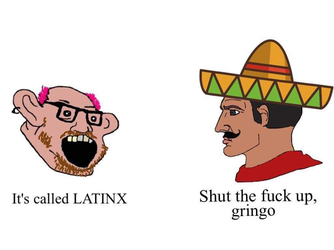
Domingo García, president of the League of United Latin American Citizens, the nation's oldest Latino civil rights organization, has instructed staff and board members to drop the word "Latinx" from the group's official communications.
García sent the directive out in an email Wednesday night, addressed to Sindy Benavides, the league's CEO; David Cruz, its communications director; and the LULAC board.
"Let's stop using Latinx in all official communications," García said, adding that it's "very unliked" by almost all Latinos.
The email included a link to a Miami Herald editorial with the headline: "The 'Latinx community' doesn't want to be called 'Latinx.' Just drop it, progressives."
"The reality is there is very little to no support for its use and it's sort of seen as something used inside the Beltway or in Ivy League tower settings, while LULAC always rep Jose and María on Main Street in the barrio and we need to make sure we talk to them the way they talk to each other," García said in a phone interview with NBC News.
"I don't know of any abuelita (grandmother) that calls her granddaughter, 'Hey you Latinx, I'm going to throw you the chancla (flip-flop).' It just doesn't happen," he said.
LULAC does not oppose people and groups that self-identify with Latinx, Mexican American, Latino or other terms, Garcia said. But as a national civil rights organization trying to appeal to as many Latinos and Hispanics as possible, LULAC needs to keep the term that everybody uses in everyday speech, he said.
García said he is not banning the use of Latinx within the organization.
The directive comes days after a poll by the Democratic polling firm Bendixen & Amandi found that 30 percent of Hispanic voters are less likely to support a politician or political organization using the word.
There has long been debate about the word Latinx, which is intended to promote inclusivity and depart from the gender-specific words in Spanish, where those ending in "o" are male and those ending in "a" are female. In plural uses, words such as Latinos are inclusive of both genders.
To many of its users, Latinx includes people who identify outside of the gender binary, such as transgender people or those who are gender-fluid. It also is seen as a "decolonizing" term, de-emphasizing the Spanish colonial rule of Latin America in the word "Hispanic."
In 2017, NBC Latino reported that Latinx "has been popping up in mainstream outlets like The New York Times, Washington Post and USA Today, and it is increasingly visible in Hispanic media as well."
According to "Latinx: A Brief Handbook" by Arlene Gamio Cuervo of the Princeton LGBT Center, Latinx first appeared in 2004 as a replacement for Latin@, which did not catch on. It returned around 2014 and its popularity spiked in 2015, the handbook states.
By last summer, however, the Pew Research Center found that 1 in 4 adults who identify as Latino or Hispanic had heard of "Latinx," but just 3 percent used it.
Latinx is often seen as a generational term, used by younger Latinos as they have sought to define their activism, greater gender inclusiveness and multiculturalism and their movement for civil rights and immigration rights.
The millennials' and Generation Z's use of Latinx is somewhat similar to the adoption of "Chicano" by young, largely Mexican American civil rights activists of the 1960s and '70s.
Chicano, too, was not always an accepted term, but there are many Latinos who have not stopped using it and it is experiencing something of a renaissance.
"When I was growing up, I was Chicano and the older generation was Mexican American, and Mexican American and Hispanic continue to be used to this day and Chicano has kind of faded out," García said.
Embracing Latinx, while debate 'should not divide us'
The group Poder Latinx is an Arizona-based progressive group focused on increasing Latino progressive voters. The group has embraced the term because it acknowledges Latino diversity, including people who are LGBTQ or Black Latinos, who are often overlooked, said Yadira Sanchez, the group's co-executive director.In working to improve Latinos' electoral power, "we want to be sure we are speaking to youth and we have seen more and more younger Latinos and progressives who are tuning into the inclusivity of our movement," Sanchez said. She noted that about 40 percent of eligible Latino voters are millennials or Generation Z.
She added that the group tailors its messages for the group it is speaking to because debates over how to define the community "should not divide us."
In the Bendixen & Amandi poll, 51 percent of Latinos ages 18 to 29, which would encompass Generation Z and the youngest Latino millennials, said it would not make a difference to them if a politician or organization used Latinx to describe the Latino community.
But 30 percent said they would be less likely to support the politician or group and 14 percent said they would be more likely to do so.
Also, in the 18-29 group, just 4 percent said Latinx comes closest to describing their ethnicity, while 66 percent chose Hispanic.
The poll of 800 people included interviews with 148 Latinos ages 18-29. The margin of error for the age group was plus or minus 8 percent.
LULAC was founded in 1929 and is the oldest Latino civil rights organization in the United States. It originated in Texas, in response to government-sanctioned discrimination and brutality against Mexican Americans. Three groups merged to form the LULAC.
Business and civic leaders and veterans, described in a LULAC history book as economic conservatives, were among its original founders.
Although not as progressive as some groups, the group has backed many progressive stands.

Latino civil rights organization drops 'Latinx' from official communication
The action by the League of United Latin American Citizens adds to the debate over a term embraced by younger Latinos and those seeking more inclusive, gender-neutral language.

Latino civil rights organization drops 'Latinx' from official communi…
archived 10 Dec 2021 14:36:27 UTC
